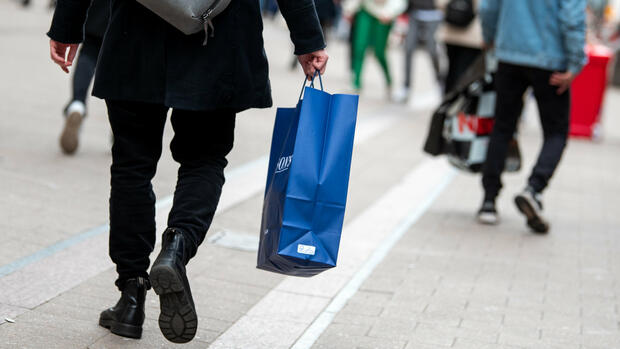The people in Germany expect a positive development both for the economy and for their individual income.
(Photo: dpa)
Dusseldorf Optimism can sometimes be contagious. Despite the increasing signs of new macroeconomic problems, the HDE consumption barometer for May continued to climb, reaching 93.77 points, its highest level since the outbreak of the Ukraine war on February 22, 2022.
Both the economic expectations for the economy as a whole and the individual income expectations of consumers increased significantly compared to the previous month. Concerns about inflation eased somewhat.
However, the propensity to buy was somewhat weaker than in the previous month. In addition, consumers are planning to save a little more again.
The consumption barometer is calculated monthly by the Handelsblatt Research Institute (HRI) for the trade association HDE. It is based on a representative survey of around 1,600 households, which were asked about their expectations for the next three months.
The consumer barometer follows the trend of the development of the Ifo business climate. The most important leading indicator for overall economic development in Germany had recently risen again slightly, but is still below the pre-war level.
The federal government raised its expectations for the economy
Federal Economics Minister Robert Habeck (Greens) on Wednesday raised the government’s economic expectations to at least 0.4 percent growth this year and announced: “A recovery is beginning.”
>> Read here: Habeck expects the economy to recover: did the government really prevent the crisis?
He referred to the federal government’s stabilization measures, which he believed to be successful. “We have given companies and private households a helping hand in difficult times and curbed the high energy prices.”
Chancellor Olaf Scholz (SPD) recently even promised the Germans a new economic miracle through the decarbonization of the economy and society. However, the fact remains: unlike in most other EU countries, Germany’s overall economic performance at the turn of the year was lower than before the Corona outbreak at the beginning of 2020. The German economy is therefore missing three years of growth.
The Federal Chancellor is much more confident about Germany’s economic future than many economists.
(Photo: dpa)
And there is no sign of a quick improvement. As the Federal Statistical Office announced in a flash estimate on Friday, the German economy stagnated at the beginning of the year. Positive impetus came from investments and exports, while both private and government consumer spending fell.
>> Read here: German economy stagnates in the first quarter
However, HRI President Bert Rürup emphasized: “These flash estimates are subject to a high degree of uncertainty and should therefore only be taken with caution.” At the beginning of January, the authority initially announced that, contrary to all expectations, the German economy had not shrunk in the fourth quarter of 2022.
Within three revisions, this zero has turned into a decrease of 0.2 percent, then 0.4 percent and now even 0.5 percent. “The basis for the first quarter was thus reduced again – not a good omen for 2023 as a whole,” said Rürup.
High inflation causes consumption to shrink
According to Ifo economics chief Timo Wollmershäuser, the German economy was split at the beginning of the year. “On the one hand, the industry is benefiting from easing supply bottlenecks and lower energy prices and has switched to a growth course. On the other hand, high inflation is eroding the purchasing power of private households and causing consumption to shrink.”
Developments on the labor market make matters worse. “The spring revival will remain weak in April,” said Andrea Nahles, Chair of the Board of the Federal Employment Agency (BA), on Friday. One of the reasons for this is the sluggish economy.
In April, the BA registered 2.586 million unemployed, just 8,000 fewer than in the previous month. Seasonally adjusted, the number of unemployed rose by 24,000 compared to March. Compared to the same month last year, 276,000 more people were registered as unemployed in April. According to the BA, unemployment would have risen compared to the previous year even without taking Ukrainian refugees into account, “but less strongly”.
Commerzbank chief economist Jörg Krämer emphasized that the ECB had already raised its key interest rate by 350 basis points because of the high inflation. Such interest rate hikes in Germany have always ended in recessions in the past. “However, on average, five quarters elapsed between the first interest rate hike and the onset of the recession,” said Krämer.
This time lag suggests that the interest rate hikes that began in July 2022 will only “hit the economy in full” in the second half of the year. Most economists are “probably too optimistic if they expect a classic upswing in the second half of the year”.
More: IMF Forecast – Global economy faces weakest growth since 1990.

